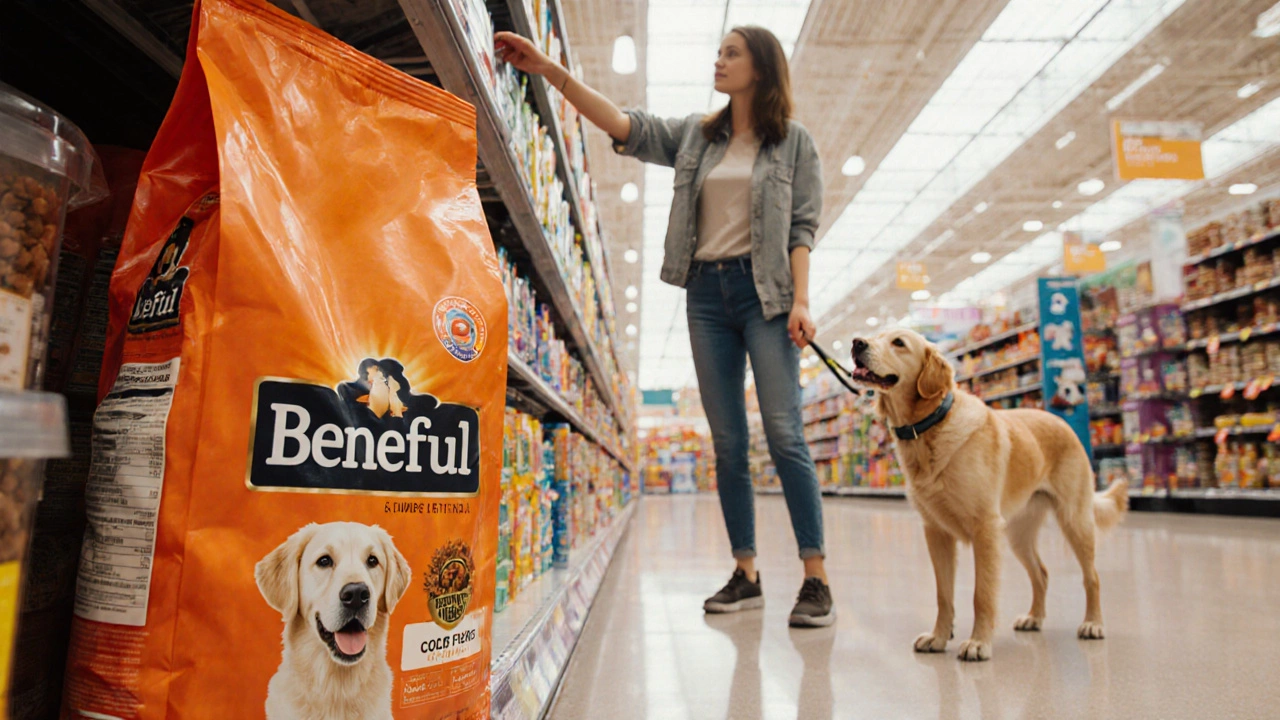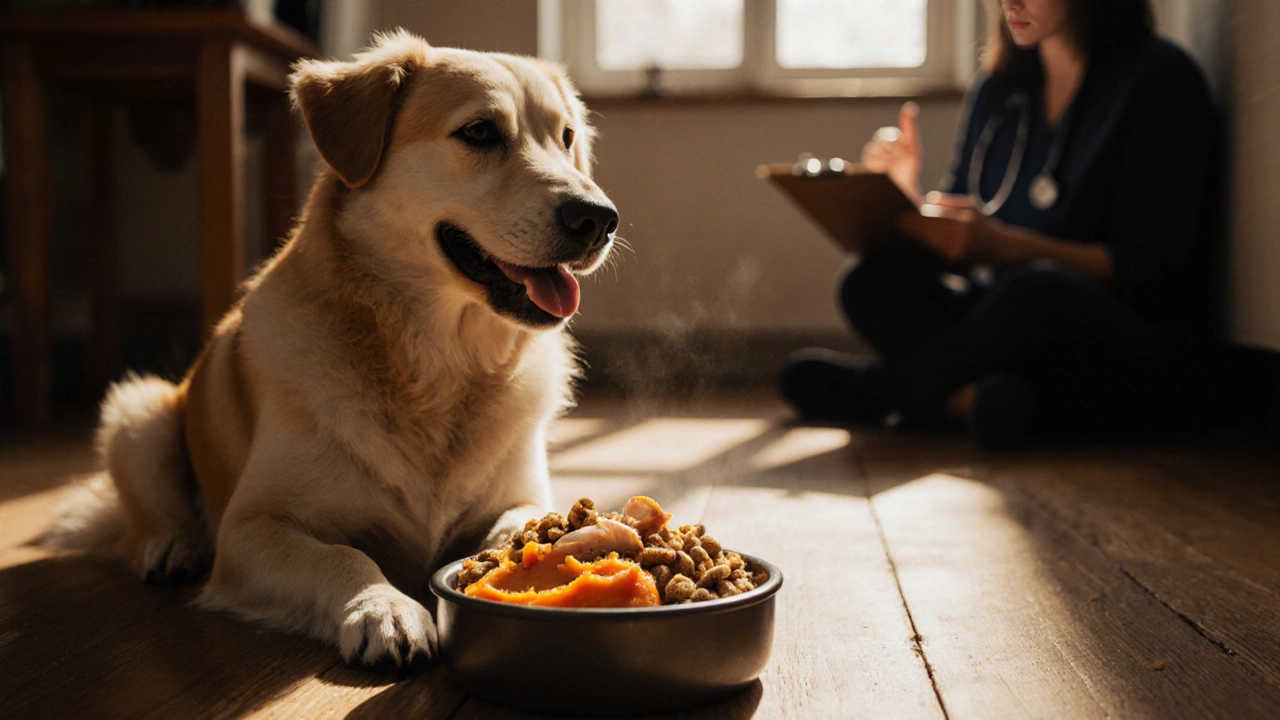
When you’re standing in the pet aisle wondering whether to pick up that bright orange bag, you probably ask yourself, "What do vets say about Beneful dog food?" It’s a fair question - after all, a vet’s opinion can signal if a brand truly supports your dog’s health or just trades on flashy packaging.
What Is Beneful?
Beneful is a line of dry dog food produced by Nestlé Purina, marketed as a "complete and balanced" nutrition solution for dogs of all ages and sizes. Launched in the early 1990s, Beneful grew into a family of formulas - grain‑free, weight‑control, senior, and even a range aimed at high‑energy working dogs. The brand’s promise centers on "real meat" and added vitamins, but the exact ingredient list and nutrient profile vary between each variant.
How Vets Evaluate Dog Food
Veterinarians don’t just glance at a bag and give a thumbs‑up. They follow a checklist that mirrors professional nutrition standards. The most common reference point is the AAFCO (Association of American Feed Control Officials) nutrient profiles. If a product meets or exceeds AAFCO’s minimum percentages for protein, fat, and essential nutrients, it passes the first hurdle.
- Ingredient quality - real animal protein versus meat meals, the presence of whole grains or legumes, and the amount of artificial additives.
- Nutrient balance - does the guaranteed analysis line up with a dog's life stage (puppy, adult, senior) and activity level?
- Safety record - any history of recalls, contamination warnings, or FDA (Food and Drug Administration) alerts.
- Digestibility & palatability - how well can a typical dog break down the food, and will they actually eat it?
When a vet reviews a brand, they cross‑reference these points with the latest research on canine health outcomes.
Veterinarian Opinions on Beneful
Across North America, Europe, and Australasia, veterinarians share a nuanced take on Beneful. The consensus can be boiled down to three recurring themes:
- Protein source concerns - Many vets note that Beneful’s primary protein comes from "chicken meal" and "beef meal" rather than fresh meat. While meals are a concentrated source of protein, they often contain rendering by‑products that some professionals prefer to avoid, especially for dogs with sensitive stomachs.
- Grain inclusion - Beneful’s standard formulas contain corn and wheat. For most dogs, these grains are harmless, but a significant minority (estimated 10‑15% of the canine population) have grain sensitivities. Vets usually recommend a grain‑free alternative for those dogs.
- Additives and preservatives - The brand uses BHT and BHA as preservatives, plus artificial colors (like citric acid‑based yellow #5). While regulatory bodies deem these safe at approved levels, many vets suggest limiting exposure, particularly for young puppies and senior dogs.
That said, several veterinarians praise Beneful for its affordability and the inclusion of added vitamins and minerals, which can simplify feeding a balanced diet without separate supplements.
Breaking Down the Nutrient Profile
Below is a typical guaranteed analysis for Beneful Adult Good Life (one of the most popular variants). Values are expressed as percentages of the total formula.
| Component | Percentage |
|---|---|
| Crude Protein | 22% |
| Crude Fat | 13% |
| Crude Fiber | 3% |
| Moisture | 10% |
| Calcium | 1.0% |
| Phosphorus | 0.8% |
When you compare these numbers to the AAFCO adult maintenance profile (minimum 18% protein, 5% fat, maximum 5% fiber), Beneful sits comfortably above the protein floor and within the fat range. However, the fiber content is on the lower side, which may affect stool bulk for dogs prone to constipation.
Beneful vs. AAFCO Standards - A Quick Look
| Nutrient | AAFCO Minimum | Beneful Value | Meets Standard? |
|---|---|---|---|
| Protein | 18% | 22% | Yes |
| Fat | 5% | 13% | Yes |
| Fiber | 3% | 3% | Yes |
| Calcium | 0.5% | 1.0% | Yes |
| Phosphorus | 0.4% | 0.8% | Yes |
Technically, Beneful ticks every box required for a complete and balanced adult diet. The real question vets ask is whether the source of those nutrients aligns with health‑optimal choices.
Potential Health Impacts Highlighted by Vets
Here are the most common health topics vets discuss when a client asks about Beneful:
- Weight management - With 13% fat, the formula is suitable for normal‑activity dogs but can lead to weight gain in sedentary pets if portion sizes aren’t carefully measured.
- Allergies and sensitivities - The presence of corn, wheat, and animal by‑products can trigger food allergies in predisposed breeds (e.g., Bulldogs, Boxers). Vets often recommend an elimination diet with a novel protein if symptoms appear.
- Digestive health - Lower fiber may not support dogs with irregular bowel movements. Adding a daily scoop of canned pumpkin or a fiber‑rich supplement can offset this.
- Long‑term joint health - Beneful includes glucosamine in some specialized formulas, but the standard adult line lacks joint‑support nutrients. Vets suggest a separate joint supplement for large or aging dogs.
Overall, the brand isn’t a direct cause of disease, but its ingredient choices can exacerbate existing issues if a dog’s diet isn’t tailored to its specific needs.

Practical Tips for Dog Owners
If you decide to feed Beneful, keep these veterinarian‑approved pointers in mind:
- Read the label: Look for "real chicken" or "real beef" as the first ingredient. If the list begins with "chicken meal" or "corn grain" you know the protein is rendered.
- Measure portions: Use the feeding guide on the bag as a starting point, then adjust based on your dog’s activity level and body condition score.
- Watch for recalls: Beneful has had two minor recalls in the past decade (2019 poultry contamination, 2022 vitamin D excess). Subscribe to the FDA’s pet food recall alerts.
- Consider life‑stage formulas: Puppies need higher protein and DHA; seniors benefit from reduced calories and added antioxidants.
- Mix in fresh foods sparingly: A tablespoon of cooked pumpkin or a few pieces of boiled chicken can boost fiber and palatability without upsetting the nutritional balance.
When in doubt, schedule a wellness exam. A vet can run a simple blood panel to see if your dog’s current diet meets its metabolic needs.
Bottom Line - Do Vets Approve Beneful?
The short answer: Beneful is nutritionally adequate, but it isn’t the gold standard for every dog. Veterinarians generally approve the brand for healthy, average‑activity dogs that don’t have specific food sensitivities. They caution owners to monitor weight, watch for allergy signs, and avoid relying on Beneful as the sole source of joint‑support nutrients or specialized health benefits.
In practice, many vets recommend Beneful as a cost‑effective baseline and then supplement with targeted foods or treats to fill any gaps. If your dog has a medical condition, a prescription diet may be a better fit.
Frequently Asked Questions
Is Beneful grain‑free better for dogs?
Grain‑free isn’t automatically superior. Vets recommend grain‑free formulas only for dogs with proven grain sensitivities. Some studies link certain grain‑free diets to canine dilated cardiomyopathy (DCM), so it’s best to stick with a balanced grain‑containing formula like standard Beneful unless your vet advises otherwise.
How often do vets see recalls related to Beneful?
Recalls are rare. Since 2000, Beneful has had two notable recalls, both quickly addressed by Purina. Vets advise checking the FDA’s pet food recall database periodically, especially after a recall is announced.
Can I feed Beneful to a senior dog with kidney issues?
Senior dogs with kidney disease need reduced phosphorus and protein. Beneful’s standard adult line meets AAFCO protein minimum but isn’t formulated for renal support. Your vet may suggest a therapeutic kidney diet instead.
What’s the best way to transition my dog to Beneful?
Mix increasing amounts of Beneful with the current food over 7‑10 days. Start with 25% Beneful, 75% old food, then gradually flip the ratio. This minimizes digestive upset.
Does Beneful contain enough omega‑3 fatty acids?
The standard formulas have modest omega‑3 levels, primarily from fish oil. For dogs with skin or coat issues, vets may suggest adding a dedicated fish‑oil supplement.





